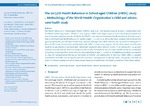The 2017/18 Health Behaviour in School-aged Children (HBSC) study – Methodology of the World Health Organization’s child and adolescent health study
Moor, Irene
Winter, Kristina
Bilz, Ludwig
Bucksch, Jens
Finne, Emily
John, Nancy
Kolip, Petra
Paulsen, Lisa
Ravens-Sieberer, Ulrike
Schlattmann, Marina
Sudeck, Gorden
Brindley, Catherina
Kaman, Anne
Richter, Matthias
The Health Behaviour in School-aged Children (HBSC) study is an international research project in collaboration with
the World Health Organization (WHO) for over 35 years. HBSC is the largest study on child and adolescent health and
one of the most important sources of data for the WHO’s international comparative health monitoring. Every four years,
data on the health and health behaviour of students aged 11, 13 and 15, as well as the social contexts and conditions for
growing up healthy, are collected. A total of 50 countries belong to the HBSC network, with 45 countries taking part in
the 2017/18 survey. Germany has contributed to the HBSC surveys since 1993/94. For the most recent 2017/18 cycle,
students at 146 schools in Germany were interviewed (response rate of schools: 15.6%). A net sample of n = 4,347 girls
and boys was achieved for Germany (response rate: 52.7%). Participation was voluntary and the survey was conducted
in German school years five, seven and nine (corresponding to ages 11, 13 and 15). A weighting procedure was applied
to allow for representative findings on the health of children and adolescents in Germany. HBSC offers a valuable
contribution to health monitoring and provides numerous starting points to identify needs, risk groups and fields of
action to initiate targeted and actual needs-based measures of prevention and health promotion in the school setting.
Dateien zu dieser Publikation
Keine Lizenzangabe
Verwandte Publikationen
Anzeige der Publikationen mit ähnlichem Titel, Autor, Urheber und Thema.
-
2023-09-07ZeitschriftenartikelMental Health Surveillance in Deutschland Walther, Lena; Mauz, Elvira; Hölling, Heike; Thom, JuliaMit der Etablierung der psychischen Gesundheit als Public-Health-Thema wird auch ihre Surveillance (Überwachung) gefordert. Am Robert Koch-Institut ist daher eine Mental Health Surveillance für Deutschland im Aufbau. Die ...
-
2008-08-29Berichte und sonstige TexteReport: "Health in Germany" Robert Koch-InstitutLife expectancy is rising and the general health situation is good, but the number of people who smoke, are too fat, take too little exercise and/or drink too much alcohol is still too high. These are the main conclusions ...
-
2022-10-26Berichte und sonstige TexteNotaufnahmesurveillance Wochenbericht 01.01.2022 - 23.10.2022SUMO TeamSUMO ist ein am Robert Koch-Institut entwickeltes und betriebenes System, welches Gesundheitsdaten für Public Health-Surveillance verarbeitet und bereitstellt. Der Notaufnahmesurveillance Wochenbericht enthält Daten der ...

